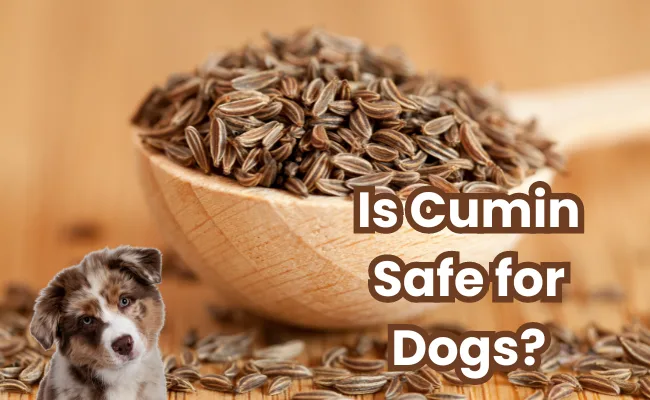
When it comes to spicing up our meals, cumin is a staple in many kitchens around the world, known for its earthy flavor and aroma. However, as responsible dog owners, we often find ourselves pondering, “Is cumin safe for dogs?” This question is crucial considering the increasing trend of integrating more holistic and varied diets for pets. Understanding the implications of adding such spices to your dog’s diet becomes essential. This article explores the safety of cumin for dogs, delving into its potential health benefits and risks. Whether you’re considering sprinkling a bit of this popular spice into your dog’s dinner or just curious about new ways to enhance your pet’s health, read on as we demystify the use of cumin in canine nutrition.
What is Cumin?
Cumin is a flowering plant in the family Apiaceae, native to the Middle East and India. Its seeds, both whole and ground, are commonly used in cooking. Cumin has a distinctive flavor that is described as earthy, nutty, spicy, and warm, which makes it a favorite in many cuisines around the world, particularly in South Asian, Middle Eastern, Latin American, and North African dishes.
Historically, cumin has been used for thousands of years, dating back to ancient Egypt, where it was not only a culinary spice but also a component of the mummification process. Today, it continues to be highly valued in culinary traditions, often used in spice blends such as curry powders, garam masala in India, and as a key ingredient in many stews, soups, and barbecue sauces.
Nutritional Profile of Cumin
Cumin is more than just a flavor enhancer; it is also packed with various health benefits due to its nutritional content. It is an excellent source of iron, providing significant percentages of the daily requirement in just one teaspoon. Iron is essential for energy production and metabolism, and it helps in maintaining healthy blood cells. Besides iron, cumin contains other minerals such as magnesium, calcium, and phosphorus.
In terms of vitamins, cumin contains B-complex vitamins like thiamine, vitamin B6, and niacin, all of which help in various body functions including digestion and nervous system health. It also has a decent amount of vitamin E, which is known for its antioxidant properties.
Moreover, cumin is rich in antioxidants and has been noted for its potential to enhance general health by reducing inflammation, promoting digestion, and reducing the risk of certain diseases. This robust nutritional profile makes cumin not only a flavorful addition to meals but also a beneficial one for overall health.
Can Dogs Eat Cumin?
When it comes to feeding dogs, caution is key, especially with ingredients that are not part of a typical canine diet. Dogs’ digestive systems are different from humans’, making some human foods unsuitable or even dangerous for them. This is particularly true for spices, which can be more intense and thus potentially problematic for pets.
General Overview of Dogs and the Safety of Consuming Spices
Spices, in general, can pose risks to dogs, primarily because their stomachs are not designed to handle a lot of spice. Many spices contain compounds that might be too harsh for a dog’s digestive system, leading to irritation or digestive upset. Moreover, some spices are outright toxic to dogs. For example, nutmeg is harmful to dogs as it contains myristicin, a compound that can cause seizures and central nervous system issues in high amounts.
Detailed Discussion on Whether Cumin is Non-Toxic for Dogs
Cumin, however, stands out as one of the spices that is generally considered safe for dogs, provided it is used in moderation. It is non-toxic to dogs and, in small amounts, can be a harmless addition to their diet. This is mainly because cumin does not contain any known compounds that are toxic to dogs, unlike some other spices.
While cumin itself is non-toxic, it’s crucial to introduce it gradually into your dog’s diet. Starting with a small amount allows you to monitor your dog for any adverse reactions, such as gastrointestinal upset or allergies. Signs to watch for include vomiting, diarrhea, or unusual lethargy, which could indicate that your dog is not tolerating the spice well.
In summary, while cumin is safe for dogs in small quantities, it should be introduced cautiously and sparingly. Always consult with a veterinarian before adding new elements to your pet’s diet, especially when it comes to ingredients that are not typically found in commercial dog food. This precaution ensures that the benefits of such dietary experiments outweigh the risks.
Benefits of Cumin for Dogs
While cumin is predominantly used as a spice in human cuisine, its potential health benefits for dogs may also be worth considering, particularly when used judiciously as part of a balanced diet. Understanding these benefits can help pet owners make informed decisions about incorporating this spice into their dog’s nutritional regimen.
Possible Health Benefits of Cumin for Dogs
One of the notable potential benefits of cumin for dogs is its role as a digestive aid. Cumin has been used in traditional medicine to help with digestion, and its properties may similarly benefit dogs. It can stimulate the secretion of pancreatic enzymes, which are crucial for the thorough digestion of nutrients. This can be particularly beneficial for dogs with digestive issues, helping to reduce bloating and gas, and improve overall digestive processes.
Additionally, cumin’s high iron content could potentially benefit dogs by supporting blood health. Iron is a vital component of hemoglobin, which transports oxygen in the blood. For dogs with iron deficiencies or for those on a vegetarian diet, a small amount of cumin might help in maintaining adequate iron levels, though it should never replace proper veterinary care or a well-balanced diet.
How Cumin Might Affect a Dog’s Metabolism Based on Available Research
From a metabolic standpoint, the effects of cumin on dogs have not been extensively studied, and most of the available research focuses on human health. However, the metabolism-boosting properties observed in humans might translate in some ways to canines. Cumin is known to have a thermionic effect, meaning it can increase the body’s ability to burn fat as it boosts metabolism. This could potentially be helpful for overweight dogs, in conjunction with a healthy diet and regular exercise.
Furthermore, the antioxidants present in cumin, such as vitamin E and A, can help combat oxidative stress in dogs. This has implications for overall health, potentially reducing inflammation and supporting immune function.
While these benefits suggest that cumin could be a healthy addition to a dog’s diet, it is crucial to remember that spices should only be a minor part of canine nutrition and not a major component. Always consult with a veterinarian to ensure that any addition to your dog’s diet, including cumin, is appropriate for their specific health needs and dietary restrictions.
Potential Risks of Cumin for Dogs
While cumin is generally safe for dogs in small amounts, like any food product that isn’t a regular part of a dog’s diet, it comes with potential risks that need to be carefully considered. Being aware of these risks can help dog owners prevent any adverse effects and ensure the health and well-being of their pets.
Possible Side Effects or Risks of Feeding Cumin to Dogs
One of the primary concerns with introducing cumin—or any spice—to a dog’s diet is the risk of gastrointestinal upset. Dogs have sensitive digestive systems that are not well adapted to handle a variety of spices. Ingesting cumin, especially in larger quantities, can lead to symptoms such as nausea, vomiting, or diarrhea. This is particularly likely if the spice is introduced suddenly and in large amounts.
Additionally, because cumin is highly aromatic and flavorful, it might lead to excessive drooling or an unusual thirst if the dog finds the flavor too intense or unpalatable. There is also a risk of aspiration (inhaling spices into the respiratory tract) which can cause coughing or respiratory distress, particularly with powdered forms of spices.
Signs of Spice Allergies or Sensitivities in Dogs
Just like humans, dogs can develop allergies to foods, including spices such as cumin. Allergic reactions can vary in severity and may not appear immediately. Signs of a spice allergy or sensitivity in dogs include:
- Skin irritations: These may manifest as rashes, hives, or itchy skin. You might notice your dog scratching more than usual or developing red, inflamed areas on their skin.
- Gastrointestinal distress: Symptoms like diarrhea, vomiting, or excessive gas can indicate that a dog is not tolerating cumin well.
- Respiratory issues: In more severe cases, an allergic reaction could lead to difficulty breathing, wheezing, or other respiratory symptoms. This is a medical emergency.
- Anaphylaxis: Although rare, anaphylaxis is a life-threatening reaction that may occur. Symptoms include sudden diarrhea, vomiting, swelling of the face or paws, difficulty breathing, and collapse.
If you observe any of these symptoms after introducing cumin (or any new food) to your dog’s diet, it’s important to discontinue its use immediately and consult with a veterinarian. When introducing any new element to your dog’s diet, it should always be done gradually and with close observation to minimize the risks and identify any adverse reactions early on.
How to Safely Introduce Cumin to Your Dog’s Diet
Introducing new foods, especially spices, into your dog’s diet requires careful consideration to ensure their health and safety. Here are some guidelines to follow:
Guidelines on Introducing New Spices or Foods to a Dog’s Diet
- Start Small: Begin with a tiny amount of cumin to see how your dog reacts. This can be as little as a pinch of ground cumin mixed into their regular food.
- Monitor Closely: Watch for any signs of adverse reactions, such as gastrointestinal upset or allergic symptoms. If any negative symptoms occur, discontinue use immediately.
- Consult Your Veterinarian: Before adding any new item to your dog’s diet, especially something as uncommon as cumin, discuss it with your vet. They can provide guidance tailored to your dog’s health needs.
Recommended Dosages and Forms of Cumin That Are Safe for Dogs
- Form: Ground cumin is easier to mix into dog food and ensures a more even distribution, minimizing the risk of consuming too much at once. Whole seeds are less advisable as they can be a choking hazard and are harder to digest.
- Dosage: The amount of cumin should not exceed a pinch (less than 1/8 teaspoon) for a medium-sized dog, and even less for small breeds. This should not be a frequent addition but rather an occasional one.
Alternatives to Cumin for Dogs
If you’re looking for safer alternatives to cumin that can provide similar benefits without the risks, consider the following:
Discussion of Safer Spice Alternatives
- Ginger: Known for aiding digestion and relieving nausea, ginger can be a safer alternative for dogs when used sparingly.
- Turmeric: This spice is known for its anti-inflammatory properties and is generally safe for dogs in small amounts.
Why Some Spices Are Favored Over Others in Canine Diets
- Spices like ginger and turmeric are favored because they offer health benefits without the strong flavors or risks of irritation that more potent spices like cumin might pose.
Expert Opinions
Insights from veterinarians and canine nutritionists generally caution against the liberal use of spices in a dog’s diet but recognize the potential benefits when used correctly and sparingly.
Summary of Any Studies or Research on Dogs and Cumin
- Research on the direct effects of cumin on dogs is limited. Most guidance is based on anecdotal evidence and general knowledge of canine health and nutrition.
Conclusion
Cumin can be safe for dogs in very small amounts, but it’s essential to introduce it cautiously and monitor your pet for any signs of discomfort or allergic reaction. Always consult with a veterinarian before introducing new foods or spices into your dog’s diet to ensure it’s suitable for their specific health requirements. For most pet owners, sticking to tried and true canine-appropriate foods and supplements might be the safer and healthier choice.



